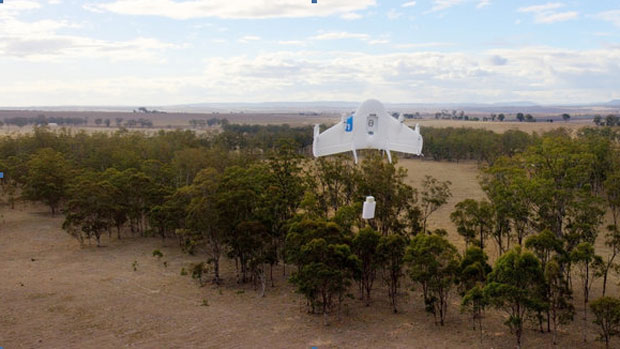Why Amazon and Google are looking more like each other
Google is making drone deliveries, while Amazon is moving into advertising. What's going on?
A free daily email with the biggest news stories of the day – and the best features from TheWeek.com
You are now subscribed
Your newsletter sign-up was successful
The final week of August 2014 was marked by the revelation that Amazon and Google are looking more like each other than ever before.
First came the news that Amazon was buying Twitch, a website which allows gamers to make videos of themselves playing games online and stream them (interspersed with ads) to a global audience of more than 50 million people. Amazon snatched the San Francisco-based Twitch for $970 million just months after Google’s attempts to buy Twitch had broken down.
Amazon also announced that it was getting ready to challenge Google in the advertising world. Its new Amazon Sponsored Links platform will first replace Google’s advertisements on its own pages and eventually offer its equivalent of Google Ad Words to a larger audience.
The Week
Escape your echo chamber. Get the facts behind the news, plus analysis from multiple perspectives.

Sign up for The Week's Free Newsletters
From our morning news briefing to a weekly Good News Newsletter, get the best of The Week delivered directly to your inbox.
From our morning news briefing to a weekly Good News Newsletter, get the best of The Week delivered directly to your inbox.
Meanwhile Google delivered dog food to farmers in Queensland, Australia via a drone in a package that looked remarkably like a plastic hot water bottle.

Amazon had grabbed headlines last Christmas when it announced it was interested in using drones for same-day delivery of its goods with its Prime Air project. But Google X - the company’s secretive division that develops futuristic projects such as Google Glass, ‘smart’ contact lenses and self-driving cars - announced via The Atlantic that it had been working on drone delivery since 2012.
So why is Amazon - a company which delivers real physical goods to your door - buying a games company? And why is Google - a company that still primarily makes its money from advertisements - delving into the world of unmanned aerial vehicles?
As it turns out, Amazon has been building up its presence in the gaming world for some time. It bought games development company Reflexive Entertainment in 2008 and launched its games app store in 2011. In 2012 it started releasing games for Facebook. Earlier this year it bought Double Helix games which produces games for consoles like the Xbox. 2014 also heralded Amazon’s introduction of games available for its Amazon Fire phone and Fire TV.
A free daily email with the biggest news stories of the day – and the best features from TheWeek.com
Still - why? Because that’s where the money is. For a few years now, the gaming industry has been “bigger than Hollywood”. We now spend more money on video games than we do watching films - both in the cinema and on our screens at home. In the UK this has been true since 2009. And now - rather than just paying to play games ourselves - we’re paying (by watching ads) to watch other people play games.
According to the Wall Street Journal last October, 32 million people watched the championship of gaming company Riot Games Inc.'s 'League of Legends' on various streaming services. That's more than the number of people viewing the series finales of TV's Breaking Bad, 24 and The Sopranos put together. Moreover, Twitch is the fourth largest source of US internet traffic, behind only Netflix, Google and Apple.
And of course Amazon delivers far more than just books. It now sells everything from e-books to unicorn meat to live ladybugs. (Seriously, I read it on the Huffington Post so it must be true.) And they’re gunning for dominance in games not just via your computer but through their phone and on TV (where most games are still played). Since no one has yet won the battle for dominance of your TV (versus your phone, computer or tablet), Amazon thinks it's got a good chance.
So to Google. What is the rationale behind Google developing drones? First, this is the realm of Google X, the group dedicated to finding innovative solutions to some of the world’s toughest problems. Google X’s projects are often called “moonshots.” (Google’s definition: "Moonshots live in the gray area between audacious projects and pure science fiction; instead of mere 10 per cent gains, they aim for 10x improvements.”
Some of these moonshots include developing contact lenses that will monitor blood glucose levels - potentially changing diabetes-sufferers’ lives - and Project Loon, which aims to provide wi-fi to rural and remote areas via balloons in the stratosphere (20 kilometres above the earth’s surface).
When Project Wing started, its goal was to deliver defibrillators to help people who have had heart attacks as fast as possible. While Google is still optimistic about the uses of Project Wing for altruistic means, it isn’t difficult to see other uses for drones within the suite of Google’s offerings.
A fleet of drones scouting out the traffic ahead will enhance Google Maps. They could also work with the stratospheric wi-fi balloons in delivering more access to the internet (and thus Google’s other products and sales of Ad Words). Google had already hinted as much when it acquired drone company Titan Aerospace last year.
So does it matter that the technology world is becoming crowded with multiple players offering the same services? Not really, that’s what competition has always been about. Does the future now hold the possibility of a farmer in Queensland downing tools to play a video game in a remote corner of Australia and streaming it to a worldwide audience via a drone and a stratospheric balloon? Thanks to Amazon and Google the answer is Yes.
-
 Political cartoons for February 14
Political cartoons for February 14Cartoons Saturday's political cartoons include a Valentine's grift, Hillary on the hook, and more
-
 Tourangelle-style pork with prunes recipe
Tourangelle-style pork with prunes recipeThe Week Recommends This traditional, rustic dish is a French classic
-
 The Epstein files: glimpses of a deeply disturbing world
The Epstein files: glimpses of a deeply disturbing worldIn the Spotlight Trove of released documents paint a picture of depravity and privilege in which men hold the cards, and women are powerless or peripheral
-
 Will AI kill the smartphone?
Will AI kill the smartphone?In The Spotlight OpenAI and Meta want to unseat the ‘Lennon and McCartney’ of the gadget era
-
 Has Google burst the Nvidia bubble?
Has Google burst the Nvidia bubble?Today’s Big Question The world’s most valuable company faces a challenge from Google, as companies eye up ‘more specialised’ and ‘less power-hungry’ alternatives
-
 Is Apple’s Tim Cook about to retire?
Is Apple’s Tim Cook about to retire?Today's Big Question A departure could come early next year
-
 How the online world relies on AWS cloud servers
How the online world relies on AWS cloud serversThe Explainer Chaos caused by Monday’s online outage shows that ‘when AWS sneezes, half the internet catches the flu’
-
 iPhone Air: Thinness comes at a high price
iPhone Air: Thinness comes at a high priceFeature Apple’s new iPhone is its thinnest yet but is it worth the higher price and weaker battery life?
-
 Is the UK government getting too close to Big Tech?
Is the UK government getting too close to Big Tech?Today’s Big Question US-UK tech pact, supported by Nvidia and OpenAI, is part of Silicon Valley drive to ‘lock in’ American AI with US allies
-
 Google: A monopoly past its prime?
Google: A monopoly past its prime?Feature Google’s antitrust case ends with a slap on the wrist as courts struggle to keep up with the tech industry’s rapid changes
-
 South Korea's divide over allowing Google Maps
South Korea's divide over allowing Google MapsTalking Points The country is one of few modern democracies where the app doesn't work